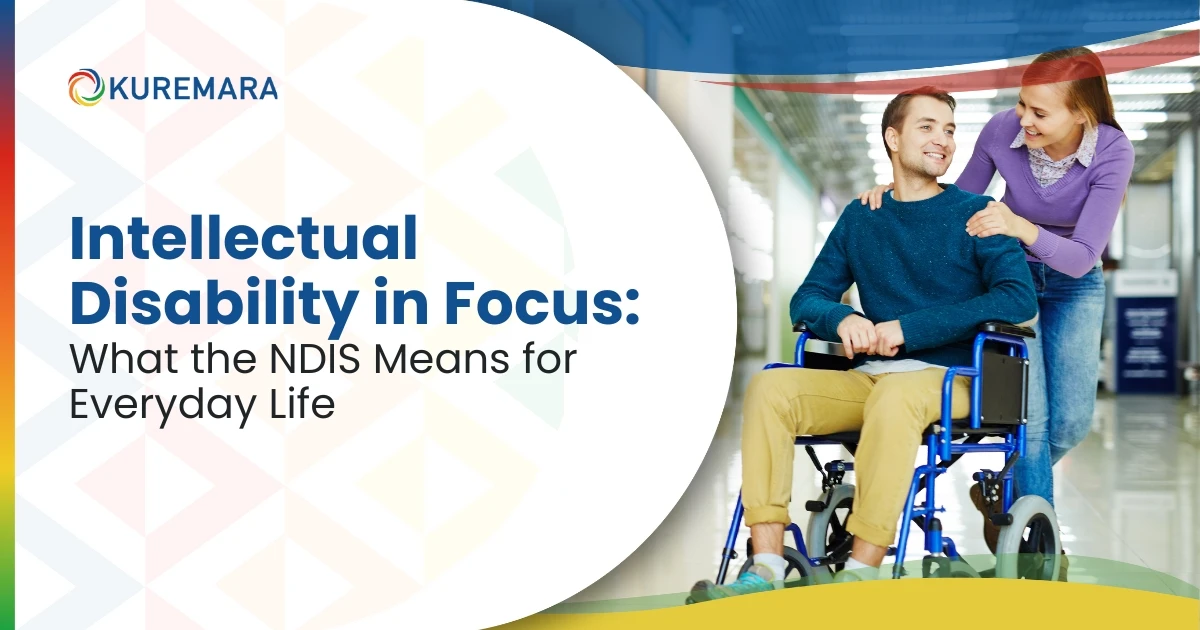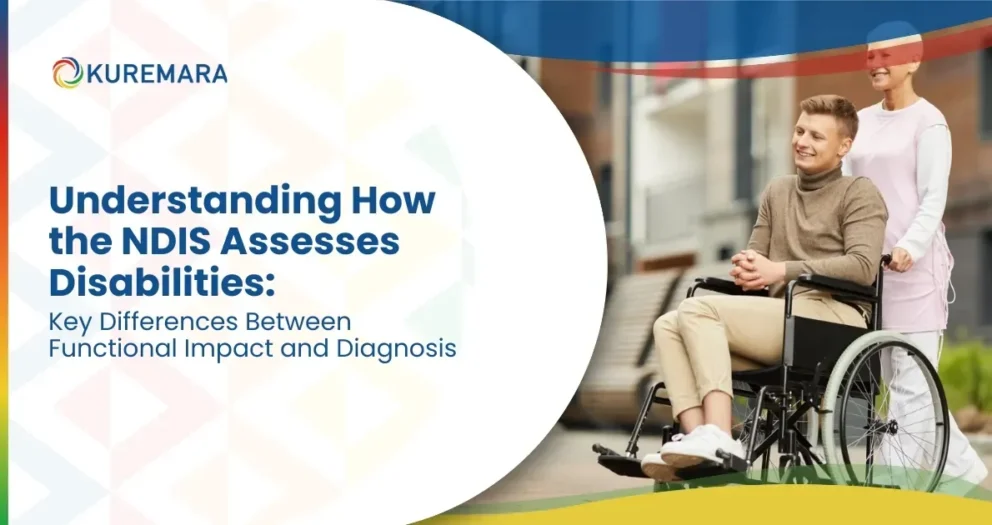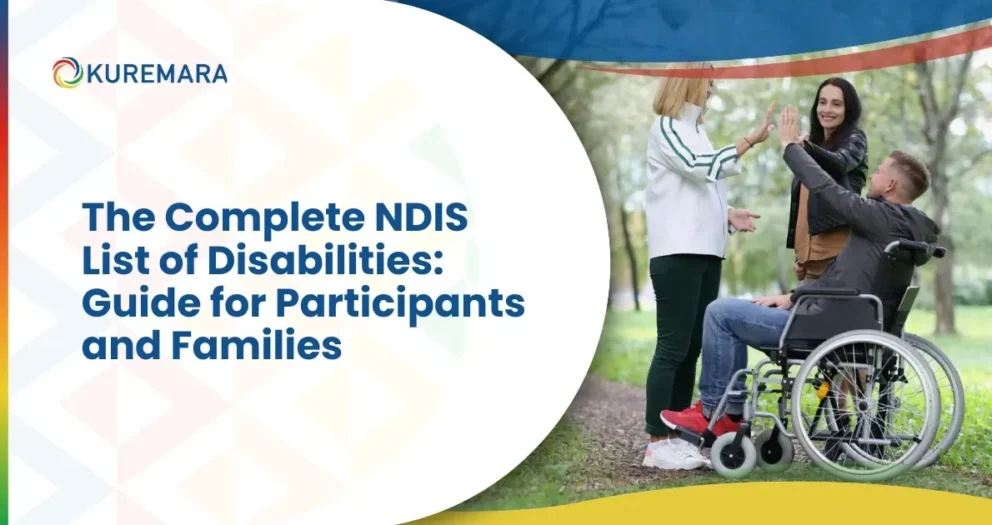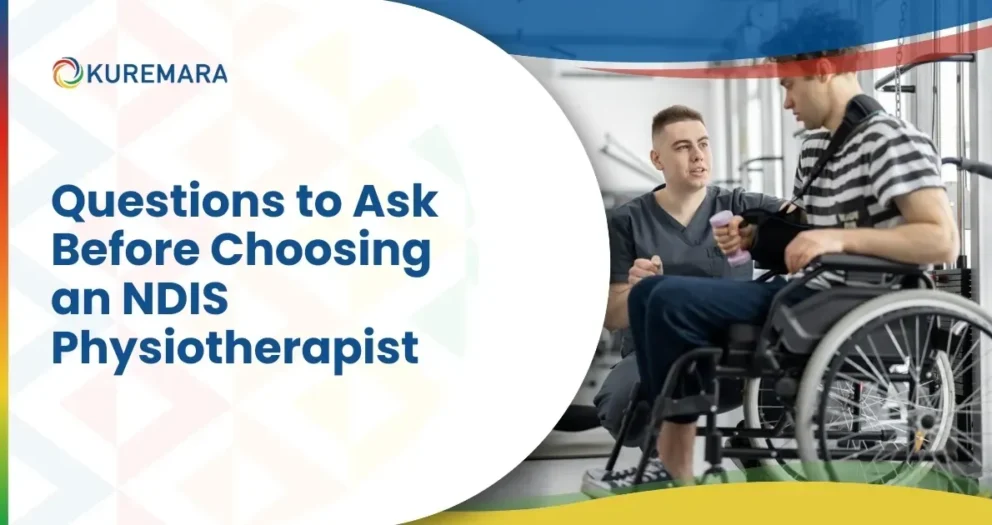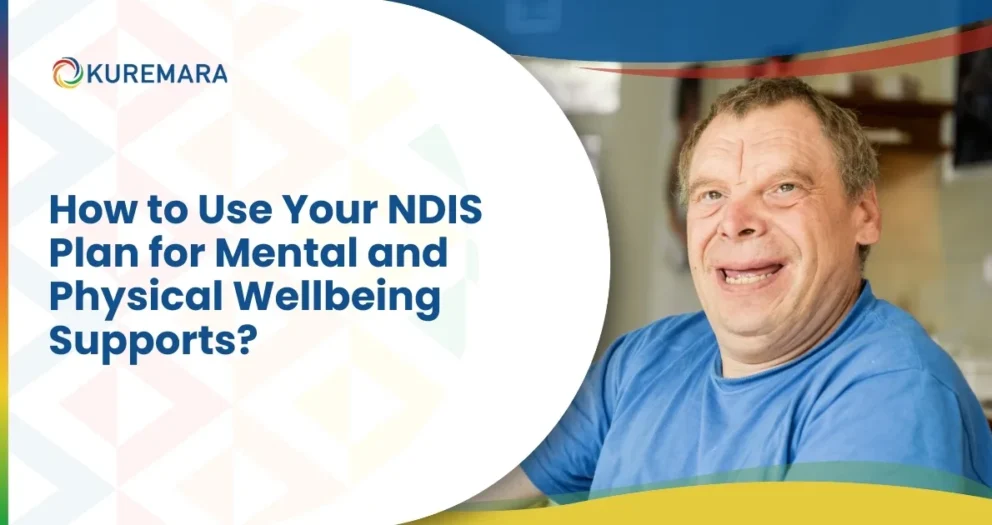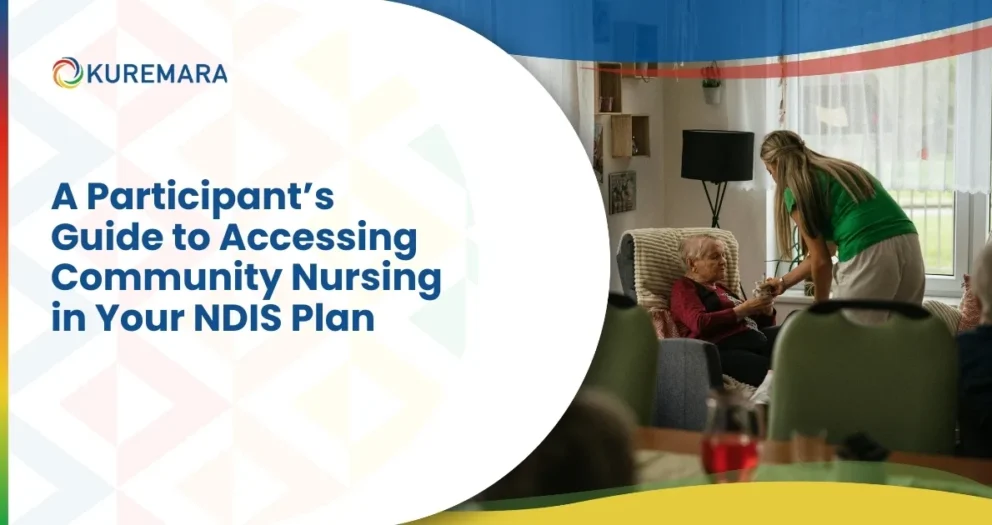Intellectual disability is a condition that affects how a person learns, thinks, and carries out everyday tasks. It’s experienced differently by each individual and is part of the natural diversity of human experience.
The National Disability Insurance Scheme (NDIS) is helping thousands of Australians with intellectual disability live more independent, meaningful lives. Through personalised support, it opens doors to learning, connection, and greater autonomy.
This article offers a deeper understanding of intellectual disability, the role of the NDIS in promoting inclusion and empowerment, and a real-life example of growth and resilience through Kuremara’s journey.
Understanding Intellectual Disability
1. What is Intellectual Disability?
Intellectual disability is a developmental condition characterised by differences in intellectual functioning and adaptive behaviour. This may affect how someone learns, reasons, solves problems, communicates, and manages everyday tasks.
It’s important to note that terms like “mental retardation” are outdated and inappropriate. Today, we embrace respectful, person-first language that recognises the person before the diagnosis.
2. Common Characteristics
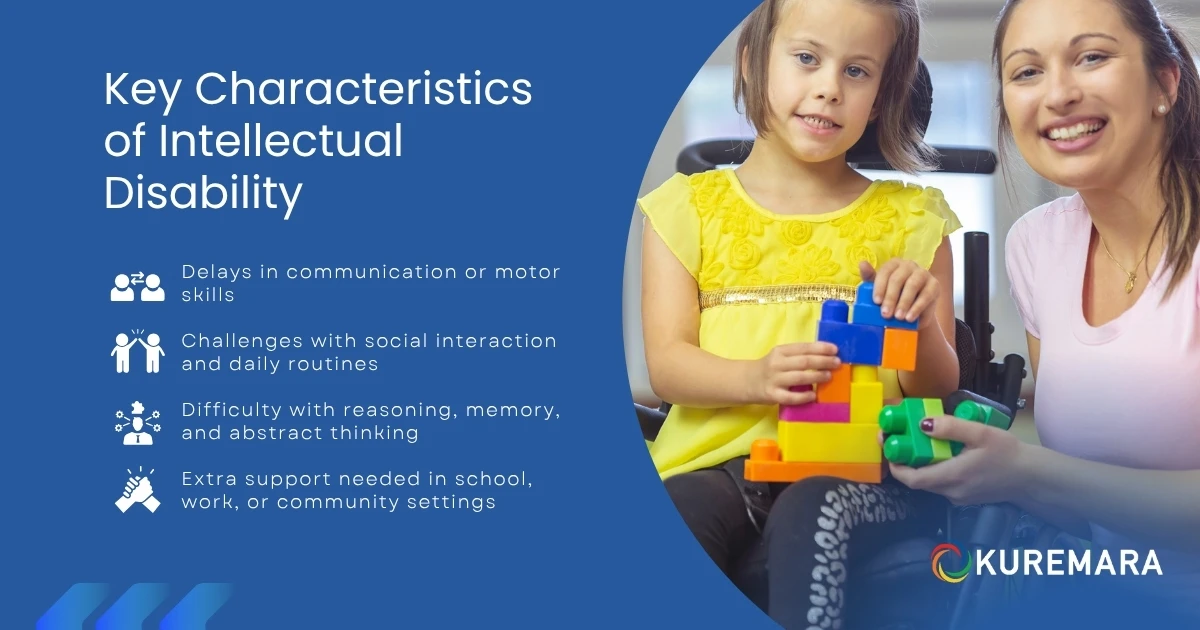
3. People with intellectual disability may experience:
-
- Delays in communication or motor skills
-
- Challenges with social interaction and daily routines
-
- Difficulty with reasoning, memory, and abstract thinking
-
- Extra support needed in school, work, or community settings
Different Levels of Support Needs
Support needs vary based on individual strengths and preferences, and may be described using general categories such as:
- Mild: Some support needed with complex tasks
- Moderate: Support required regularly for daily living and communication
- Severe/Profound: Frequent or full support needed in most areas
Every person is unique and should be supported in a way that aligns with their goals, values, and potential.
Causes of Intellectual Disability
Intellectual disability may be caused by:
- Genetic conditions: e.g., Down syndrome or Fragile X syndrome
- Complications during birth or pregnancy
- Injuries or illnesses in early childhood
These causes are diverse and not always preventable.
Is Autism an Intellectual Disability?
No, Autism Spectrum Disorder (ASD) is a separate neurodevelopmental condition. While some individuals with autism may also have an intellectual disability, many do not. Each person’s experience and support needs are different.
Diagnosis and Assessment
1. Why Early Diagnosis Matters
Early diagnosis provides clarity and ensures individuals and families can access the right support at the right time. It also helps with educational planning, therapy, and applications for NDIS funding.
2. Who Can Make a Diagnosis?
In Australia, intellectual disability is usually diagnosed by a qualified:
-
-
- Paediatrician
-
-
-
- Psychologist
-
-
-
- Psychiatrist
-
-
-
- Developmental specialist
-
3. What Is Involved in the Assessment?
Assessment includes:
-
-
- Cognitive testing (e.g., IQ tests) to understand thinking and problem-solving ability
-
-
-
- Adaptive behaviour assessments to understand how the person functions in everyday settings (e.g., self-care, social skills)
-
-
-
- Family interviews and input from educators or health professionals
-
These evaluations are done in a respectful, inclusive manner, and always involve the person and their support network.
4. NDIS Access and Assessments
A confirmed diagnosis of intellectual disability may be used when applying for the NDIS. Supporting evidence is usually required, such as psychological assessments and functional reports.
Support and Interventions
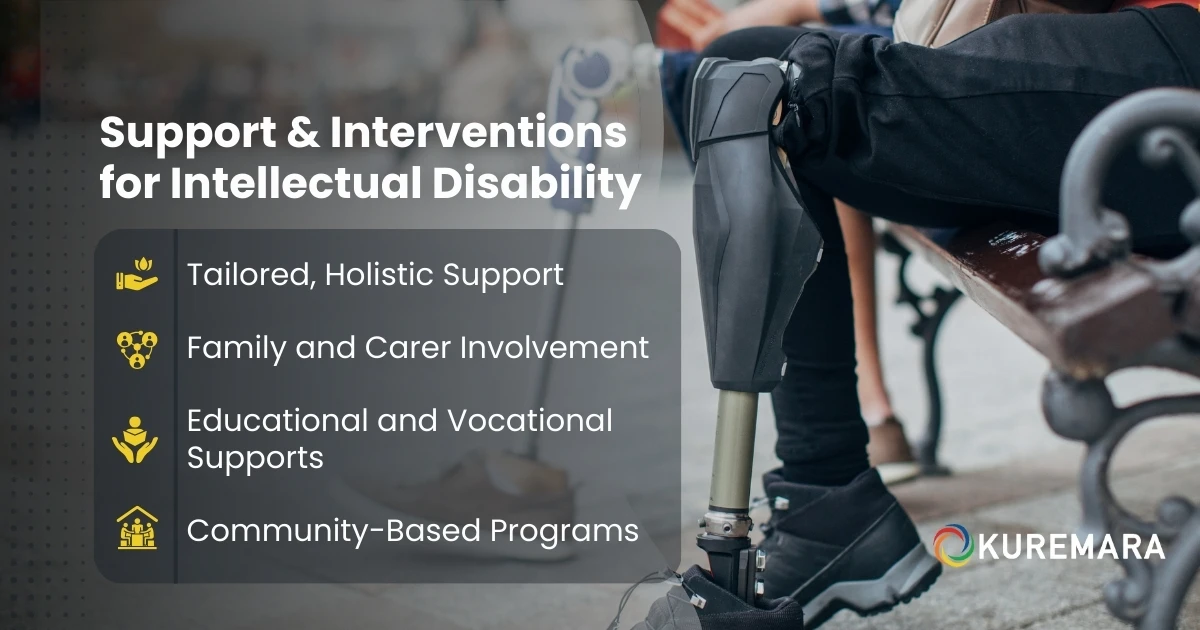
A. Tailored, Holistic Support
No two people experience intellectual disability in the same way, which is why personalised support makes all the difference. Interventions are designed to meet the unique strengths, goals, and needs of the individual.
Common Interventions May Include:
-
-
- Speech therapy – to develop communication skills
-
-
-
- Occupational therapy – for building independence in self-care and motor skills
-
-
-
- Behavioural support – to promote emotional regulation and reduce harmful behaviours
-
-
-
- Psychological support – to build self-esteem and coping skills
-
-
-
- Social skills training – to encourage friendships and community engagement
-
B. Family and Carer Involvement
Support often works best when families and carers are involved. Training, respite care, and peer support groups are available to empower carers and reduce burnout.
C. Educational and Vocational Supports
Many individuals benefit from special education programs, learning support officers, and transition planning for school-leavers. Vocational training, supported employment, and NDIS-funded job coaching can help with career pathways.
D. Community-Based Programs
Community centres, disability services, and inclusive recreation programs play a vital role in helping people with intellectual disability stay active, connected, and valued.
NDIS: Empowering People and Promoting Inclusion
* Understanding the NDIS
The National Disability Insurance Scheme (NDIS) supports Australians with permanent and significant disability by providing access to services that improve their quality of life.
* Eligibility Includes:
-
- Being under 65 at time of access
-
- Meeting residency requirements
-
- Having a permanent and significant disability
* Types of Support for People with Intellectual Disability
1. Core Supports
-
-
- Daily living assistance (e.g., personal care, meal preparation)
-
-
-
- Help with transport and accessing the community
-
-
-
- Social and recreational activities
-
2. Capacity Building Supports
-
-
- Therapy services like occupational therapy, speech therapy, and counselling
-
-
-
- Programs that build confidence, daily skills, and social connections
-
-
-
- Training to improve decision-making, money management, and communication
-
3. Capital Supports
-
-
- Access to assistive technology, like communication devices
-
-
-
- Modifications to the home to improve safety and independence
-
4. Person-Centred Planning
The NDIS encourages participants to set their own goals and make choices that reflect their values and aspirations. Each plan is co-designed with the participant and their support team to reflect individual needs and dreams.
Opening Doors to New Possibilities
With the right support, individuals can take part in community life, engage in employment or education, develop skills, and pursue personal interests. The NDIS enables people to focus on what they can do, not just on what challenges they face.
Debunking Myths About Intellectual Disability
Despite increased awareness, several misconceptions still exist about intellectual disability. These myths can lead to stigma, exclusion, and misunderstanding. Let’s explore and clarify some of the most common ones:
Myth 1: People with intellectual disability can’t learn.
Fact: Everyone can learn. People with intellectual disability may learn at a different pace or in different ways, but with the right support, they can achieve personal, educational, and professional goals.
Myth 2: Intellectual disability is the same as mental illness.
Fact: Intellectual disability and mental health conditions are different. Intellectual disability affects cognitive and adaptive functioning, while mental illness refers to emotional and psychological challenges. However, individuals may experience both and require tailored supports for each.
Myth 3: People with intellectual disability will never be independent.
Fact: Independence looks different for everyone. Many individuals with intellectual disability live fulfilling lives, make their own choices, work, form relationships, and contribute meaningfully to their communities.
Myth 4: Children with intellectual disability will “grow out of it.”
Fact: Intellectual disability is a lifelong condition. However, with early intervention and ongoing support, children can develop essential skills and lead enriched lives.
Myth 5: People with intellectual disability are always happy or unaware of their challenges.
Fact: People with intellectual disability experience the full range of human emotions, including joy, frustration, pride, and sadness. They are aware of their experiences and deserve to be heard and understood.
Myth 6: They don’t need to be included in decision-making.
Fact: Everyone has the right to be involved in decisions about their life. With the right tools, communication strategies, and support, people with intellectual disability can express preferences and actively participate in their planning.
Rights and Advocacy for People with Intellectual Disability
A. Human Rights Protections in Australia
People with intellectual disability are entitled to the same rights as everyone else, supported by:
-
-
- The United Nations Convention on the Rights of Persons with Disabilities (UNCRPD) – upholds rights to dignity, education, healthcare, and community inclusion
-
-
-
- The Disability Discrimination Act 1992 (Cth) – protects against discrimination in schools, workplaces, housing, and more
-
-
-
- NDIS Code of Conduct & Participant Rights – ensures NDIS participants are treated fairly, safely, and with respect
-
B. Why Advocacy Matters
Advocacy empowers people to:
-
-
- Speak up for their needs, preferences, and choices
-
-
-
- Access services and supports more effectively
-
-
-
- Be involved in decisions that affect their lives
-
-
-
- Challenge unfair treatment or barriers
-
C. Types of Advocacy in Australia
-
- Self-Advocacy: Building confidence to speak for yourself
-
- Individual Advocacy: One-on-one support for specific issues
-
- Systemic Advocacy: Working to improve systems and policies
-
- Legal Advocacy: Helping navigate legal or rights-based concerns
D. Finding an Advocate
Organisations like Inclusion Australia, People with Disability Australia (PWDA), and disability advocacy networks in each state offer independent advocacy support. These services are free, confidential, and available to anyone with disability.
Kuremara’s Story: Strength, Support, and Success
Kuremara is a registered provider who helps identify a person with an intellectual disability. Their journey reflects courage, growth, and the power of inclusive support. Kuremara faced barriers in areas like communication, decision-making, and social inclusion. Support was limited, and navigating daily tasks independently felt out of reach. Through the NDIS, Kuremara accessed person-centred services including speech therapy, community support programs, and assistive technology. These helped improve communication, build routine, and boost confidence.
Achievements and Growth
Kuremara’s progress has been inspiring. They now:
-
-
- Participate in creative activities and community events
-
-
-
- Cook simple meals independently
-
-
-
- Use visual aids for time management
-
-
-
- Maintain supportive relationships and new friendships
-
Looking to the Future
With ongoing support, Kuremara hopes to pursue part-time employment, learn new life skills, and give back to the community that supported them. Their journey is a testament to what’s possible when barriers are removed and strengths are celebrated.
Moving Forward Together
The NDIS continues to play a critical role in transforming lives, creating opportunity, and fostering inclusion. For people with intellectual disability, it offers a meaningful path toward independence, contribution, and belonging.
But support doesn’t end there; building an inclusive society takes collective understanding, empathy, and action. Let’s continue to listen, learn, and create spaces where everyone can thrive.
* For Individuals and Families
If you or someone you care for is living with an intellectual disability, explore how the NDIS can provide tailored support to help reach personal goals. Visit the NDIS website or connect with a local support coordinator.
* For the Community
Promote inclusion by learning about intellectual disability and sharing this knowledge. Volunteer, support advocacy efforts, and challenge stigma wherever you see it.
* Let’s Spread Awareness
Share this blog to inspire hope, build understanding, and show that with support and inclusion, every individual can lead a full and meaningful life.
Everyone deserves the chance to live the life they choose—with dignity, respect, and opportunity.
 care@kuremara.com.au
care@kuremara.com.au
